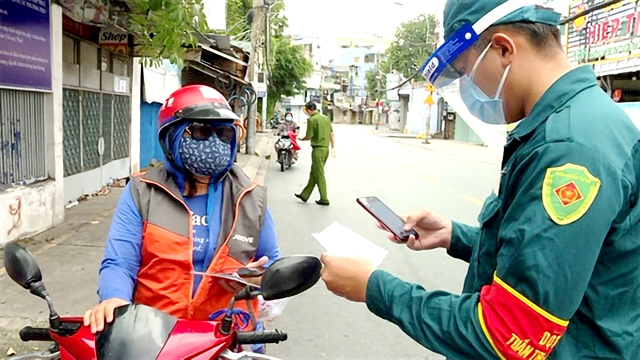Delivery service companies will have to test their staff with rapid antigen tests provided by the health sector, and update the testing results into the city’s shared database beginning Friday (Sept 24).

Delivery service companies will have to test their staff with rapid antigen tests provided by the health sector, and update the testing results into the city’s shared database beginning Friday (Sept 24).
The city’s Department of Health will provide tests to each company based on the number of shippers registered with the city Department of Industry and Trade. Pooled samples from three people will be tested every three days.
This week, businesses are training their shippers in how to do the test and how to input data on testing results on apps set up by companies or provided by the Department of Information and Communications.
Any shipper failing to get the test as required will not be allowed to operate.
The number of shippers registered with the city’s Department of Industry and Trade surged after travel rules between districts were relaxed. The number had risen to over 82,100 as of September 19, compared to 20,000 before September 17, according to the department.
In the past few days, many shippers have had to wait in long lines for hours in the early morning at mobile medical stations to be tested, which has added pressure to the stations whose main task is to care for COVID-19 patients treated at home, and test and vaccinate locals.
Since September 16, shippers have been allowed to deliver goods across districts from 6am to 9pm every day, but they have to be pool-tested once every two days, with fees paid by the city.
Shippers are required to strictly comply with pandemic preventive measures and have at least one vaccination shot, and be registered with the city’s Department of Industry and Trade.
Testing costs
Many businesses in HCM City have complained about testing costs at healthcare facilities and said they would buy the test kits and provide them to their employees.
Trần Đức Nghĩa, director of Delta International Co., Ltd., said: “The cost of COVID-19 testing for cargo drivers is a huge burden for businesses. With a cost of VNĐ200,000 for a rapid antigen test or PCR test with the pooled sample valid for 72 hours, on average, the test fee for a driver costs about VNĐ2 million a month.”
A single PCR test will cost between VNĐ700,000 and 800,000 per sample.
With a fleet of about 150 vehicles, the cost for drivers at the firm is currently VNĐ300 million a month, which the company has had to pay for 18 months, according to Nghĩa.
A representative of an enterprise in Trà Vinh Province said his company has implemented the “3-on-site” model, which requires workers to work, eat and sleep at the workplace, since the end of July.
Every week, the company has to stop production for half a day to test employees, which costs VNĐ4 billion a month. On average, the business takes more than four hours per week to gather all employees from various departments for sampling.
The cost of testing for employees is around VNĐ240 million per month. In addition, operation costs have increased by nearly 30 per cent compared to before the implementation of the “3-on-site” model.
Experts said the Government should allow businesses to conduct testing with the supervision of medical staff to save costs. Businesses would save about 70 per cent of testing costs for employees.
As many as 800,000 drivers involved in transporting goods and millions of workers in key industrial areas across the country have to be tested once every three to five days.
According to the Ministry of Health, there are three types of COVID tests: rapid testing, rapid antigen testing to detect SARS-CoV-2, and real-time polymerase chain reaction (RT-PCR) testing.
HCM City, the country’s pandemic epicentre, has recorded nearly 350,000 cases since the end of April when the fourth wave broke out. — VNS





